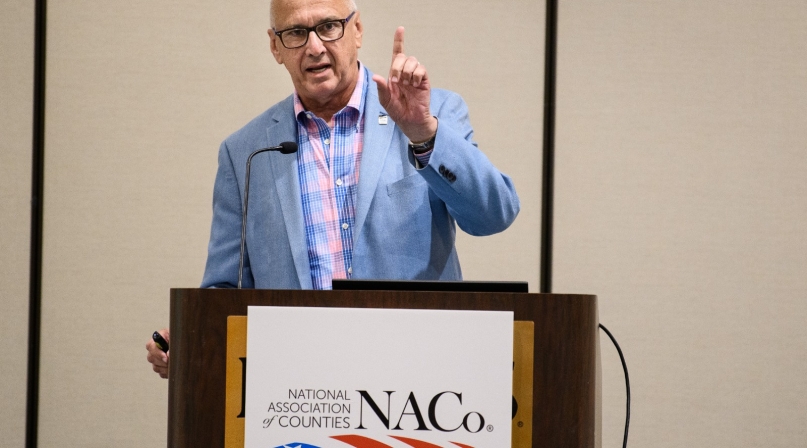Forge partnerships to improve your county’s health equity
Upcoming Events
Related News

Key Takeaways
When most people think about improving health equity, they might think it’s mainly about trying to level the playing field when it comes to being able to afford to see a doctor.
But it’s also about affordable housing, access to fresh food, the ability to get affordable prescriptions and protecting children and the elderly from harm, members of NACo’s Healthy Counties Advisory Board noted Saturday.
The board met at NACo’s Annual Conference to discuss some of their more challenging problems when it comes to health equity or as Nick Macchione, chair of the group, put it: “The things that keep you up at night.” Macchione is director of San Diego County’s Health and Human Services Agency and kicked off the standing-room-only meeting.
One type of health equity that some might not consider is advocating for and creating parks and recreational areas that promote a healthy lifestyle, especially in low-income areas, said Wake County, N.C. Commissioner Sig Hutchinson, who took part in a panel discussion of the topic.
Adding parks, open space, bike-sharing and bike lanes creates added value beyond the obvious, he noted, including economic development, physical activity, stress reduction, community building and environmental opportunities associated with preservation of land.
The causes of health equity issues — a “chronic crisis” — are due in part to poverty sometimes caused by racism, sexism and other problems that must be dealt with, said fellow panelist Los Angeles County Supervisor Mark Ridley-Thomas. “This crisis is exacerbated by long-standing inequities.”
Some 918 people died last year in the county who were homeless and mentally ill, he said.
Homelessness is also a problem in Franklin County, Ohio.
“Housing means everything, without housing you can’t have health, you must have a roof over your head,” said panelist Kenneth Wilson, Franklin County, Ohio administrator. In his county, “we’re 54,000 units short of what we need for affordable housing.”
Within the last couple of weeks, he noted, the county announced their plan to invest $65 million over the next 10 years for affordable housing along with millions of dollars kicked in by the City of Columbus and private companies.
To make this work, partnerships are important, he said.
“We know that health equity is really about access and opportunity,” Wilson said. “In order to provide access and opportunity to the ‘have-nots’ you must have strong alliances with your nonprofits and private sector.”
Attachments
Related News

Drug tracking software helps counties identify trends, save lives
Florida counties are using an artificial intelligence tool called Drug TRAC to track and report drug trends, with the aim of providing quicker outreach and saving lives.

White House Executive Order establishes national substance use disorder response
On January 29, the White House issued an Executive Order (EO) establishing the Great American Recovery Initiative, a new federal effort aimed at coordinating a national response to substance use disorder (SUD).

USDA and HHS release new dietary guidelines
On January 7, U.S. Department of Agriculture Secretary Brooke Rollins and U.S. Department of Health and Human Services Secretary Robert F. Kennedy, Jr. unveiled the new Dietary Guidelines for Americans, 2025–2030.